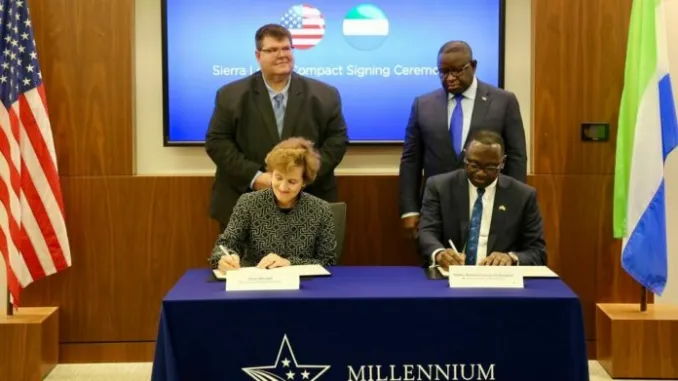The Millennium Challenge Corporation (MCC), a U.S. government agency, announced on Thursday the signing of a $480 million compact with Sierra Leone aimed at dramatically improving the country’s electricity infrastructure and access.
MCC CEO Alice Albright and Sierra Leone’s Minister of Finance Sheku Bangura signed the agreement, which is expected to benefit 4.6 million people in a country where 70 percent of the population currently lacks access to electricity.

The five-year grant, supplemented by a $14.2 million contribution from the Sierra Leone government, will fund three major energy projects. The Transmission Backbone Project will expand the transmission network to increase coverage and reliability of service. It’s also designed to facilitate additional energy trading with other West African countries and support private sector power generation, including the Nant Energy project financed by the U.S. Development Finance Corporation.
The Distribution and Access Project aims to increase grid reliability by reducing losses and barriers to access in selected communities, with a specific focus on schools, health facilities, businesses, and households.
The Power Sector Reform Project will focus on improving the energy sector’s sustainability by reducing service costs, generating additional private financing, and improving regulations.
The compact’s approval comes after a period of uncertainty following Sierra Leone’s controversial 2022 presidential and general elections. The U.S. government and several international observers had initially rejected the results, which declared President Julius Maada Bio the winner, as lacking credibility.
However, the MCC cited “significant progress” made by the Sierra Leone government in implementing the Agreement for National Unity (ANU) as a factor in moving forward with the compact. The ANU provides a pathway towards electoral reform and inter-party dialogue.
“This compact represents a transformative investment in Sierra Leone’s future,” said Albright. “By dramatically improving access to reliable electricity, we’re not just powering homes and businesses; we’re powering economic growth and opportunity for millions of Sierra Leoneans.”
The MCC emphasized that during the next phase of partnership, its Board of Directors and Congressional stakeholders expect the Sierra Leone government to continue implementing the ANU and the recommended reforms to strengthen democratic institutions, national unity, and accountability for electoral misconduct.
This compact builds on a previous partnership between MCC and Sierra Leone. In 2014, the two collaborated on a $40.54 million threshold program to support policy and institutional reform in the water and electricity sectors.
Sierra Leone’s economy has been struggling with low growth, high unemployment, and poor access to electricity. This substantial investment is expected to play a crucial role in addressing these challenges and stimulating economic development.
As the compact moves into its implementation phase, both U.S. and Sierra Leonean officials express optimism about its potential impact on the country’s infrastructure and economy. However, watchdog organizations emphasize the need for transparent oversight to ensure the funds achieve their intended purpose.


